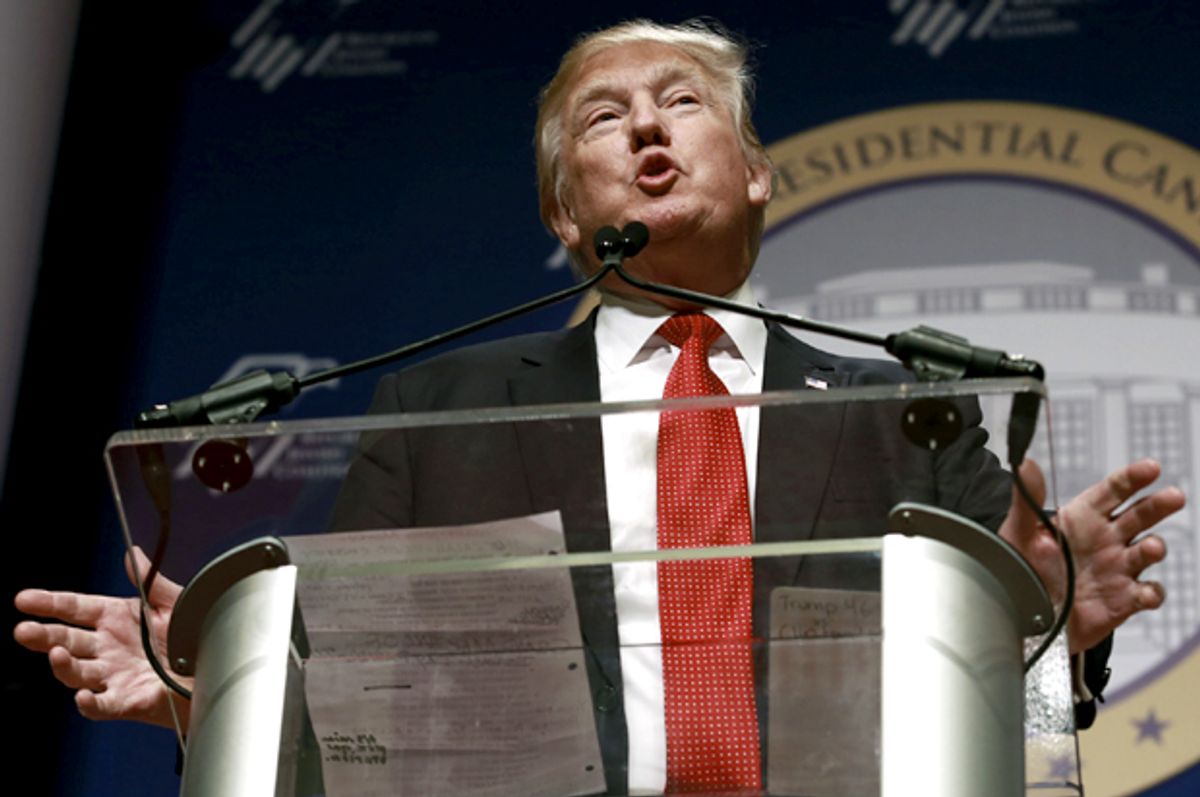Anyone who has paid notice to the GOP primary over the past several weeks has no doubt heard Donald Trump make the following dubious claim: that, on September 11, 2001, he viewed television news footage of thousands of New Jersey Arabs cheering the attacks of the World Trade Center.
“There were people that were cheering on the other side of New Jersey, where you have large Arab populations,” Trump told ABC News' George Stephanopoulos during an interview on Nov. 22. “They were cheering as the World Trade Center came down. I know it might be not politically correct for you to talk about it, but there were people cheering as that building came down — as those buildings came down.”
To be clear, the claim has been thoroughly debunked. Even Ben Carson, who initially backed Trump's false version of events, later said he may have actually been referring to an event somewhere else—perhaps, it seems, this footage of celebrations in East Jerusalem.
As Carson told Fox News' Megyn Kelly on Nov. 23:
“Well, what we were talking about is the reaction of Muslims after the 9/11 attack and if they were in a celebratory mood. I was really focusing on that it was an inappropriate thing to do, no matter where they were. They asked me did I see the film. I did see the film. I don’t know where they were. But I did see a film of Muslims celebrating."
"It’s important,” Kelly pointed out to Carson, “whether these are American Muslims in New Jersey versus folks over in Iran or the Middle East.” But, in reality, that's the very distinction that doesn't matter to Trump and Carson. The conflation of Arabs in East Jerusalem and New Jersey is an easy trick to pull off, because Americans often view Arabs and Muslims as an undifferentiated mass.
So it doesn't really matter to Trump and his followers which Muslims were celebrating and where, just as the distinction between ISIS militants and the Muslims fleeing them is lost on anti-refugee agitators. Indeed, even the distinction between Arabs (an ethnic category) and Muslims (a religious one) is often not comprehended -- except for when people like Jeb Bush suggest that Arab Christian refugees should be given priority over their Muslim neighbors.
As Louise Cainkar, a sociologist at Marquette University, explained in an email to Salon:
“Arabs and Muslims, often conflated, are usually portrayed by the mainstream U.S. media in collectivities, such as mobs, or groups of men praying. Rarely are they portrayed in the mainstream media as individuals, except when they are reviled individuals. This type of representation feeds and confirms the notion that all are alike, that all think alike, and that any one of them can be suspect.”
Take, for example, the harrowing scene below, in which two CNN anchors hector Yasser Louati, a spokesperson for the Collective Against Islamophobia in France, and demand that the country's entire Muslim community take responsibility for the Paris attacks.
“Why is it that no one within the Muslim community there in France knew what these guys were up to?” CNN's John Vause demanded. After the interview ended, Vause added that he has “yet to hear the condemnation from the Muslim community on this, but we’ll wait and see.”
“The idea that either Arabs or Muslims can be individualized and can occupy many different kinds of positions and that we can treat them as individuals is rare,” says Moustafa Bayoumi, a professor of English at Brooklyn College and the author of This Muslim American Life: Dispatches From the War on Terror. "The problem is that its a reflection of our racist assumptions when it comes to Arabs and Muslims that they act always collectively and irrationally and en masse.”
Damaging stereotypes of Arabs and Muslims, as Edward Said's classic book "Orientalism" details, are quite old. And as the film "Reel Bad Arabs" demonstrates, they have long dominated in Hollywood: See the perennial depictions of inept but vicious warlords and terrorists, lecherous sheiks, alternately oppressed and hyper-sexualized women — the list goes on.
Showtime’s “Homeland” is one current example. As James Poniewozik wrote at the New York Times earlier this year:
"Homeland" often uses scenes in which crowded streets in the Middle East and the Islamic world (in addition to Pakistan and Afghanistan, the show has also ventured to Iraq, Lebanon and Iran) stand for a kind of alien, unintelligible chaos, a teeming welter of noise and dust and veils in which danger can lurk anywhere.
This crowded and faceless vision has also been subtly but frequently propagated by mainstream news outlets, which reduce Arab public opinion to the phrase “Arab street.” Research published by Terry Regier and Muhammad Ali Khalidi in 2009 found that the term “Arab street” is widespread in American press and often suggests “a presumed seething underclass within Arab society,' where individuals blur into faceless “demonstrations, of crowds of people waving banners and flags and chanting slogans.”
By contrast, there is “almost no incidence of the expressions American street, French street, Israeli street, and the like in the US media,” which “leaves the impression that public opinion in this part of the world is of a different kind than public opinion elsewhere.”
Usage of the term, they found, increased after the September 11th attacks.
The upshot is a vision of Muslims and Arabs as an undifferentiated mass. As a man protesting a long-standing mosque's plant to construct of a new house of worship in Virginia put it, “You are terrorists. Every one of you are terrorists. I don't care what you say.”
White and Christian extremists, of course, are not generally taken to be representatives to represent all of white Christian society—except, notably, by groups like ISIS.

Shares